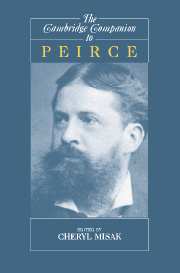Book contents
- Frontmatter
- 1 Charles Sanders Peirce (1839-1914)
- 2 Peirce's Place in Pragmatist Tradition
- 3 Peirce and Medieval Thought
- 4 Reflections on Inquiry and Truth Arising from Peirce's Method for the Fixation of Belief
- 5 Truth, Reality, and Convergence
- 6 C. S. Peirce on Vital Matters
- 7 Peirce's Common Sense Marriage of Religion and Science
- 8 Peirce's Pragmatic account of Perception
- 9 The Development of Peirce's Theory of Signs
- 10 Peirce's Semeiotic Model of the Mind
- 11 Beware of Syllogism
- 12 Peirce's deductive Logic
- Note on References
- Bibliography
- Index
6 - C. S. Peirce on Vital Matters
Published online by Cambridge University Press: 28 May 2006
- Frontmatter
- 1 Charles Sanders Peirce (1839-1914)
- 2 Peirce's Place in Pragmatist Tradition
- 3 Peirce and Medieval Thought
- 4 Reflections on Inquiry and Truth Arising from Peirce's Method for the Fixation of Belief
- 5 Truth, Reality, and Convergence
- 6 C. S. Peirce on Vital Matters
- 7 Peirce's Common Sense Marriage of Religion and Science
- 8 Peirce's Pragmatic account of Perception
- 9 The Development of Peirce's Theory of Signs
- 10 Peirce's Semeiotic Model of the Mind
- 11 Beware of Syllogism
- 12 Peirce's deductive Logic
- Note on References
- Bibliography
- Index
Summary
INTRODUCTION
C. S. Peirce argued that a true belief is the belief we would come to, were we to inquire as far as we could on a matter. A true belief is a belief which could not be improved upon, a belief which would forever meet the challenges of reasons, argument, and evidence.
Peirce initially put this idea in the following unhelpful way: a true belief is one which would be agreed upon at the hypothetical or ‘fated’ end of inquiry (See W 3, 273, 1878). It is this formulation which is usually attacked by those who see little value in the pragmatist view of truth. But a much better formulation is this: a true belief is one which would withstand doubt, were we to inquire as far as we fruitfully could into the matter. A true belief is such that, no matter how much further we were to investigate and debate, it would not be overturned by recalcitrant experience and argument (CP 5.569, 1901, 6.485, 1908). I have argued elsewhere (Misak 2000:49f) that this formulation, unlike the first, is not vulnerable to the standard objections to the pragmatist account of truth.
I have also argued (Misak 2000) that this formulation is very friendly to cognitivism about morals – very friendly to the idea that moral judgements fall within the scope of truth, knowledge, and inquiry. Our ethical beliefs might well aspire to truth, as do our beliefs in science, mathematics, and discourse about ordinary middle-sized objects.
- Type
- Chapter
- Information
- The Cambridge Companion to Peirce , pp. 150 - 174Publisher: Cambridge University PressPrint publication year: 2004
- 14
- Cited by



